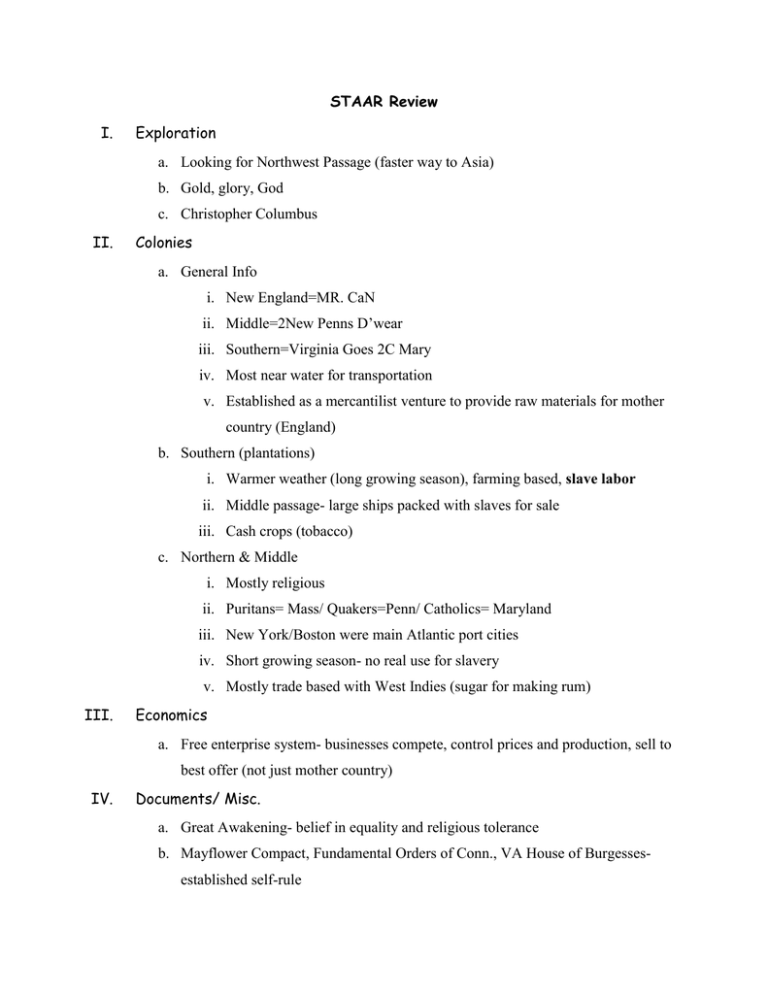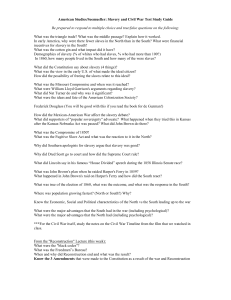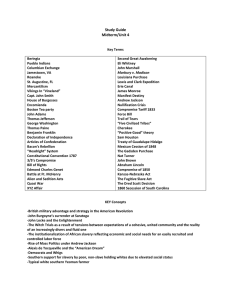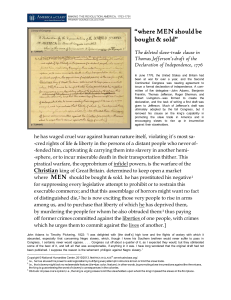STAAR Review Outline
advertisement

STAAR Review I. Exploration a. Looking for Northwest Passage (faster way to Asia) b. Gold, glory, God c. Christopher Columbus II. Colonies a. General Info i. New England=MR. CaN ii. Middle=2New Penns D’wear iii. Southern=Virginia Goes 2C Mary iv. Most near water for transportation v. Established as a mercantilist venture to provide raw materials for mother country (England) b. Southern (plantations) i. Warmer weather (long growing season), farming based, slave labor ii. Middle passage- large ships packed with slaves for sale iii. Cash crops (tobacco) c. Northern & Middle i. Mostly religious ii. Puritans= Mass/ Quakers=Penn/ Catholics= Maryland iii. New York/Boston were main Atlantic port cities iv. Short growing season- no real use for slavery v. Mostly trade based with West Indies (sugar for making rum) III. Economics a. Free enterprise system- businesses compete, control prices and production, sell to best offer (not just mother country) IV. Documents/ Misc. a. Great Awakening- belief in equality and religious tolerance b. Mayflower Compact, Fundamental Orders of Conn., VA House of Burgessesestablished self-rule V. Revolution a. British policies (Acts)- opposed by most colonists i. Acts caused revolution b. Mississippi River was western boundary British refused to let settlers move past Appalachian Mountains i. Proclamation of 1763 c. Articles of Confederation- created during war to unite (very weak) i. No central power (can’t tax, enforce laws, create military) d. Declaration of Independence (Philadelphia 1776)- listed grievances, described unalienable rights (L,L, P of H) e. Saratoga was turning point- France decided to help colonies f. Haym Soloman/James Armistead key in revolution g. Treaty of Paris- ended the war h. Northwest Ordinance sectioned the new territory for settlement (no slavery) VI. Constitution (Philadelphia, PA 1787) a. A of C=too weak (couldn’t tax, no courts, etc.) b. Many documents, people, and events influenced writing (Magna Carta, English Bill of Rights, John Locke, etc.) c. New Jersey and Virginia Plans were reconciled with Great Compromise=creation of dual congress (Senate/ House of Representatives) d. Bill of Rights (first ten amendments/ addressed grievances) i. First Amendment= RAPPS e. Amending (Article V) – 2/3 both houses of Congress/ ¾ States (allow for changing times) f. Federalists- supported stronger national govt., sharing power, loose interpretation of Constitution (Hamilton, Adams) g. Anti-Federalists- supported states’ rights, Bill of Rights, strict interpretation of Constitution (Jefferson) VII. George Washington a. Set many precedents still used today b. Created cabinet to advise c. Hamilton was treasurer- primary goal was to solve economic crisis of debt i. Three part economic plan 1. tax for needed money/ tariffs to promote American goods 2. pay off war debt (combine all state debts to one national debt) 3. create national bank ii. South agreed to take debt in exchange for moving capital d. Whiskey rebellion- showed rebellion wouldn’t be tolerated e. Neutrality between France/ Britain (France was ally, Britain needed for trade) f. Passed Federal Judiciary Act of 1789-create lower courts, number of Justices, etc. g. State department- foreign affairs, Jefferson h. Farwell address i. Political parties would split nation ii. US should remain neutral for time VIII. Election of 1796 a. Political parties played a role in election b. Election winner was President, runner-up was Vice President (Adams/ Jefferson, from different parties) c. XYZ Affair- French ask for bribes to negotiate peace in seas d. Alien and Sedition Acts- prevented free speech and press against govt. IX. New Economy a. Democratic-Republicans (Madison/Jefferson)- farming/ag based b. Federalists (Adams/Hamilton)- believed it should be industry/manufacturing X. Louisiana Purchase 1803 a. Jefferson was troubled because Constitution didn’t give permission b. West= Rocky Mountains & east= Mississippi River XI. The War of 1812 a. Treaty of Ghent- formally ended the war (Dec. 1814) b. Made Jackson a hero XII. Industrialization a. Factory System b. Most located in New England XIII. Inventions a. Interchangeable Parts (Eli Whitney) b. Cotton Gin c. Steamboat advanced transportation d. Telegraph advanced communication XIV. Missouri Compromise e. Admitted Missouri as slave state XV. Monroe Doctrine/Court Cases a. Prevent European expansion in America b. Gibbons vs. Ogden i. Ruled Federal Government regulated INTERSTATE commerce c. McCulloch vs. Maryland i. Stated states could not tax the Federal government XVI. Jacksonian Democracy a. Based on giving power the people- took away owning property as a voting requirement b. Second Bank of the US i. Veto c. Nullification Crisis i. Crisis ended with Henry Clay’s lowered “Compromise Tariff” d. Indian Removal i. Trail of Tears e. Finding gold in Georgia/ desire for land forced removal f. Whig Party- Formed in opposition to Jackson XVII. Manifest Destiny a. Idea that US should span from sea to sea b. Missionaries settled Oregon- Oregon Trail followed to settle Oregon c. Mormons fled to Utah for religious purposes-Mormon Trail d. Santa Fe Trail-Economic XVIII. US/ Mexican War a. Provoked by desire to expand westward b. Ended with Treaty of Guadalupe Hidalgo (US won) c. Acquired California, Utah, and Nevada …..NOT TEXAS XIX. Gold Rush a. People were known as forty-niners (1849) b. CA became a state XX. Immigration a. Artisans put out of business by factories b. Germans and Swedish moved to Midwest to pursue farming XXI. Women’s rights movement a. Seneca Falls- center for women’s rights XXII. b. Stanton/ Mott- Fought at Seneca Falls for women’s rights Abolitionist movement a. Similar to women’s movement b. Underground Railroad helped slaves flee to freedom c. Abolitionists were against new western states as slave states XXIII. Compromises Compromise of 1850- was created due to unbalance in Congress needed to admit California as a FREE state a. Kansas-Nebraska Act-Stephen Douglas i. Made slavery in territory vote (popular sovereignty) XXIV. Political Parties b. Northern Democrats- supported popular sovereignty c. Southern Democrats- supported slavery d. Republican Party- formed because of weak stand on slavery by Whigs (1st Free Spoil Party) XXV. Causes of the Civil War a. Southerners believed banning slavery was a violation of states’ rights e. Works like Uncle Tom’s Cabin made northerners more opposed to slavery f. Issue of whether states or national gov’t had final say interpreting the Constitution XXVI. Supreme Court Case g. Dred Scott Case (Dred Scott v Sandford) i. Makes slavery constitutional by making slaves PROPERTY (5th Amendment) ii. Increased sectional conflict by opening slavery to the new territories iii. Case is an extension of Judicial Review established in Marbury v. Madison XXVII. Union/ Northa. Led by Abraham Lincoln b. Wanted to keep U.S. together XXVIII. Confederacy/ South a. Believed sale of cotton would get European aid (King Cotton) XXIX. Civil War/ Battles a. Start in 1861=Southern attack on fort in harbor of Charleston, S.C. (Fort Sumner) b. Antietam- most casualties in ONE DAY c. Southern surrender was at Appomattox Courthouse d. Vicksburg siege cut Confederacy in two at Mississippi River e. After loss at Gettysburg in 1863 the South would never cross into Union territory again XXX. Abraham Lincoln a. Stated in 2nd address he planned to work toward peace and unity rebuild the Union. Primary goal was to preserve the Union XXXI. Emancipation Proclamation i. Gave freedom to slaves living in the Confederacy ii. shifted his goal in war from restoring peace to ending slavery iii. led to 13th amendment of ending slavery a. Gettysburg Address iv. Similar to the Declaration of Independence because it supported ideas of self-government & human rights for ALL b. More power was given to federal government XXXII. Abe Lincoln a. Assassinated by Booth b. Johnson took office XXXIII. Radical Republicans a. Wanted South punished b. Attempted to remove Johnson XXXIV. Grant as President a. Corrupt b. Caused financial panic of 1873 c. Hayes wins next election but compromises to end Reconstruction XXXV. Black Codes a. Restrict Freedman rights given during Reconstruction i. Poll Taxes/ Literacy Tests b. Jim Crow Laws i. Passed to segregate restrooms, railcars etc. XXXVI. Homestead Act a. Gives land to Western settlers XXXVII. Dawes Act a. Encourages Indians to live like “Americans” XXXVIII. Morrill Act a. Gives Land to build A and M colleges




